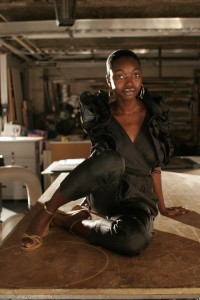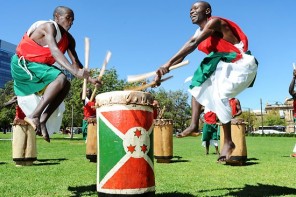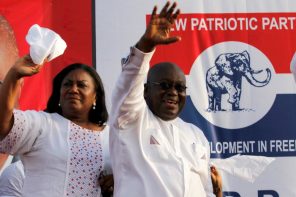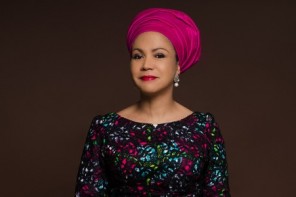You met her in this month’s Inspire Favorite. Nana Ekua Brew-Hammond’s book Powder Necklace was critically acclaimed, receiving praise such as “winning debut” by Publisher’s Weekly or “for readers who enjoyed Edwidge Danticat’s Breath, Eyes, Memory or Chimamanda Ngozi Adichie’s Purple Hibiscus” by Library Journal.
As a talented writer, model, artist and fashionista Nana-Ekua is determined to leave as complete a record of our culture as possible for the next generation so they have all they need to dissect it and improve it. Here’s the complete interview:
1. Who is Nana Ekua Brew-Hammond and how did she become a writer?
I’ve always been and wanted to be a writer. Growing up in Queens, I wrote reams in my diary and made up stories, song lyrics—you name it. I loved family road trips because I could write for hours, and at family parties, I would steal away to the quiet room with all the coats on the bed, and write.
When I graduated from college, the internet was just beginning to offer content beyond chat rooms. I started pitching websites and got a few paying assignments. In tandem with the website pitching, I would write query letters to different magazines and hand deliver them to the different publishing houses working my way from Hearst Tower (57thStreet and 8th Avenue) to Conde Nast (Times Square) to Vibe Magazine (on Lexington Ave near 23rdStreet).
On one of these trips, I took my query to Trace Magazine’s SoHo office. Because Trace was a small indie operation, there was no security guard or mailroom to drop my pitch into the slush pile. I took the stairs right on up into the loft space office. The Editor-in-Chief /Publisher was there, and he asked me to come in for an interview the following day. I did, and waited for hours for him to come and speak with me. When he finally came over, he interviewed me. I left with a job as an intern and ultimately became the magazine’s Assistant Editor!
2. Did you always know you wanted to be a writer? When did you decide it was what you wanted to do?
I always knew I wanted to write, but I didn’t know I could be a “writer.” My parents were immigrants and wanted us, their children, to stay on a career track that would guarantee a big salary and a comfortable living. Professional writing, in their minds, would not offer the stable comfortable living they wanted for us, so they did not encourage it at all.
But in college, I had an unnatural preoccupation with writing papers. I would stay up into the night writing and rewriting, more obsessed with the flow than the content. For my birthday, my sister gave me a journal with the title “Book Woman,” and she told me I could be a book woman if I wanted to be. That journal was my permission.
3. When and how did the idea for Powder Necklace come to you?
When I was going through the experience in Ghana, I remember telling one of my schoolmates that I was going to write about it one day. She told me: “Just don’t go and exaggerate.” I wrote versions of the story while I was in college and in the years that followed graduation, but I didn’t gather the nerve to complete it and start pitching it to agents and publishers until the early 2000s.
4. Can you explain what the process behind publishing a novel is? From the idea, to writing to editing then publishing.
I knew I wanted to write a book about my experience attending secondary school in Ghana, but I was not sure how to tell the story. Initially, it was going to be a memoir, but after completing a draft, I realized that in telling my truth, I would be telling (my version of) other people’s truths in the process, which I did not feel equipped to do. I did not know the motivations or back-stories of my head mistress or classmates or dorm mates, and if I had stayed on that track, I was sure I would end up telling a lopsided story filtered through my own biases.
Once I abandoned the idea of writing it as narrative non-fiction, I was free to make the story more universal and explore the experience more objectively. I started to see what it was like for my schoolmates to have me enter their space, and I had to admit that I looked down on them for no other reason than I was born outside of Ghana.
It took me about a year and a half to write the book, but to publish it I would need a literary agent to sell the book to a publisher. That took four years. I pitched relentlessly, and was rejected every time, yet each rejection offered a glimmer of hope. Many of the agents advised me to rework certain parts and resubmit the manuscript for them to look at. I would do so, and the agent would ultimately decline to represent the work. It was a frustrating process, but when I finally came across an agent that liked the work as it was, she sold it within two months of signing me—to Simon and Schuster!
S&S bought the book in 2008, at the height of the economic recession so they held the release until 2010. In 2009, we started the editing process. The copyeditor kept me honest as far as the details e.g. you said she was wearing a red dress on page 16, so why a green dress on page 17. My story editor made small suggestions about the story flow.
Once the editing process was over, my story editor sought my recommendations for what the cover should look like. She sent me some executions S&S’s Art Department had come up with. I gave my feedback, and then I learned the book was given a firm release date!
In terms of pay, I was given an advance for the book in three stages. The first portion of my advance came when I signed on with S&S. The second was given to me when I turned in the edited manuscript. The last was given to me when the book was released.
5. What are some of the challenges in writing and publishing a novel?
The biggest challenges for me when it comes to writing are discipline and time. It’s really hard to find an unobstructed amount of time to write, and when that time does avail itself, I have to be disciplined enough to seize it. After publishing the novel, the challenge becomes getting the word out.
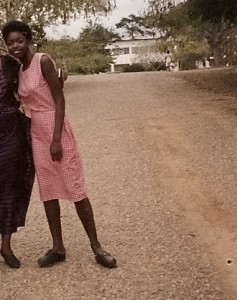 |
| Nana-Ekua in Secondary School |
6. On your website you mentioned that going to secondary school in Ghana changed your life, how so?
Attending Mfantsiman Girls’ Secondary School ripped my world wide open. Before going to Ghana, my world was Queens, New York. My family, my friends, the programs on television, the songs on the radio, and the books on our shelves defined the world to me. When I went to Ghana and left my family there to be on my own at boarding school, I realized the world didn’t revolve around me, or what I thought. The world was so much bigger than Queens. Attending Mfantsiman made me eager to learn how life is lived in other parts of the world, and taught me to respect other people’s ways of doing things.
7. Have you done some promotion for the book in Ghana? If so, how was it received over there?
In August 2010, I launched Powder Necklace in Ghana with radio and television appearances that culminated in a launch at the Silverbird Bookstore in Accra Mall, and a reading with the Writers Project of Ghana. It was an amazing experience.
Ghanaians expressed a lot of pride. Older Ghanaians in particular love the book because it has reminded them of their “good old days” at boarding school. Younger Ghanaians appreciate seeing an aspect of their experience in print.
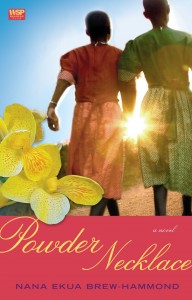 8. You have written for many news and entertainment sources both online and in print, as well as worked for big names like l’Oréal, what is one of your best experiences as a journalist?
8. You have written for many news and entertainment sources both online and in print, as well as worked for big names like l’Oréal, what is one of your best experiences as a journalist?The L’Oreal pitch was so much fun. I wrote my thesis on the politics of the black beauty ideal so it was really cool to examine beauty from another perspective alongside a group of incredibly thoughtful and talented people.
9. You are also a talented artist, model and fashionista, where does your inspiration come from?
I think it’s so important to leave as complete a record of our culture as possible for the next generation so they have all they need to dissect it and improve it. Writing, Fashion, Photography, and Travel are my passionate interests. I think they are windows to begin experiencing other cultures. The operative word being “begin.”
It’s one thing to wear a dress made by a collective of Ghanaian seamstresses, for example, or admire the photography of Seydou Keita—and another thing entirely to understand the dynamic of the culture, and what we can respectfully and humbly—as opposed to opportunistically—learn from it.


